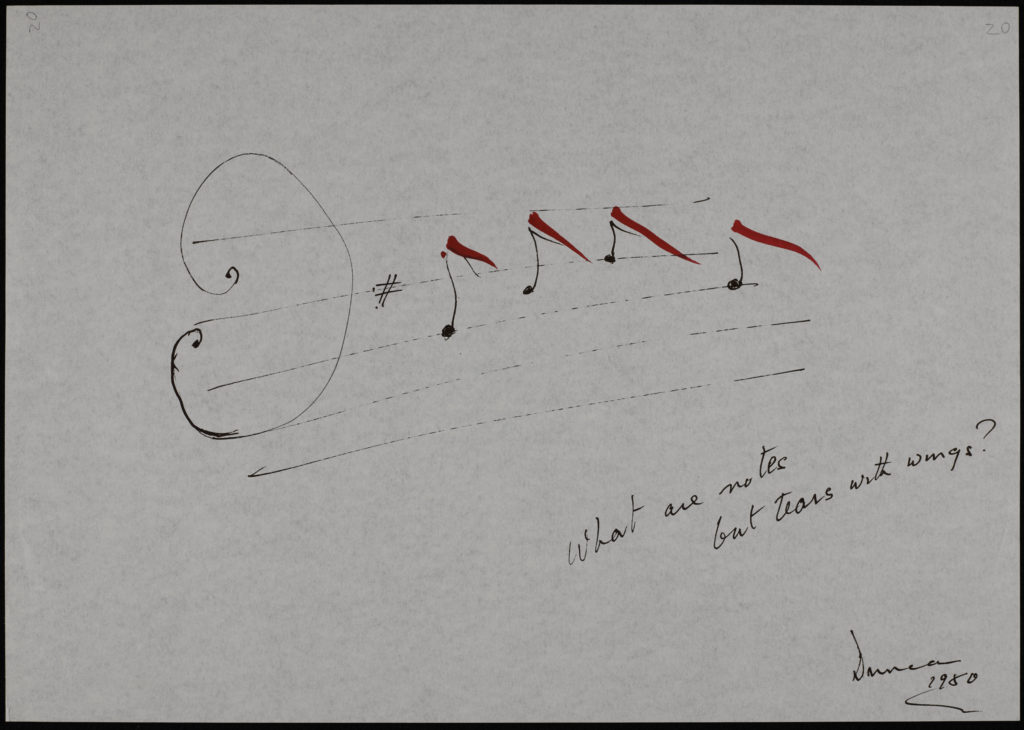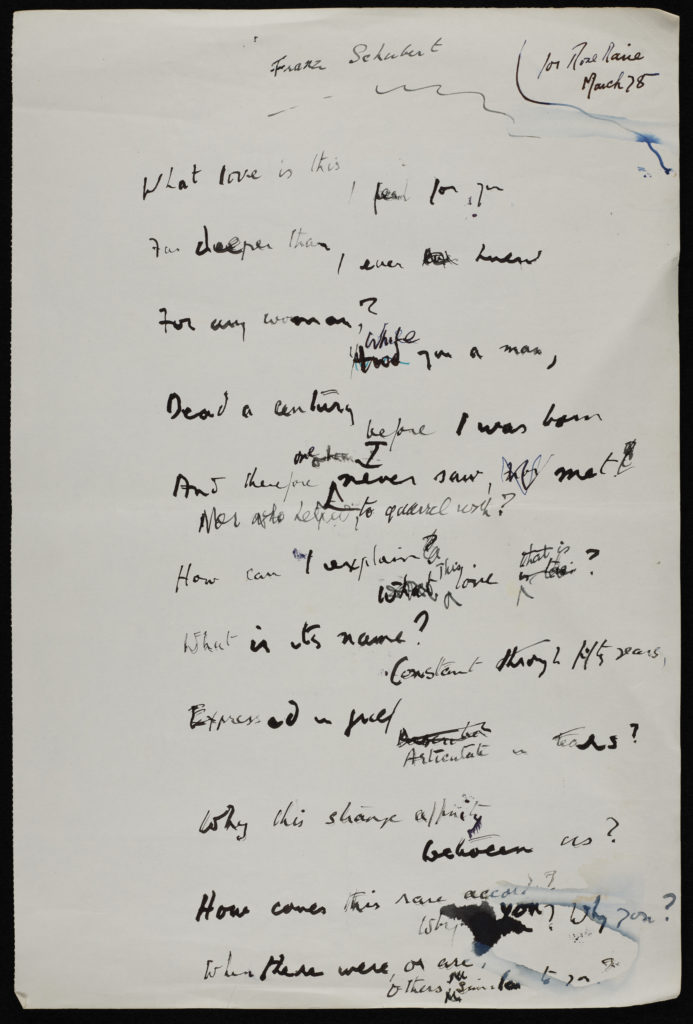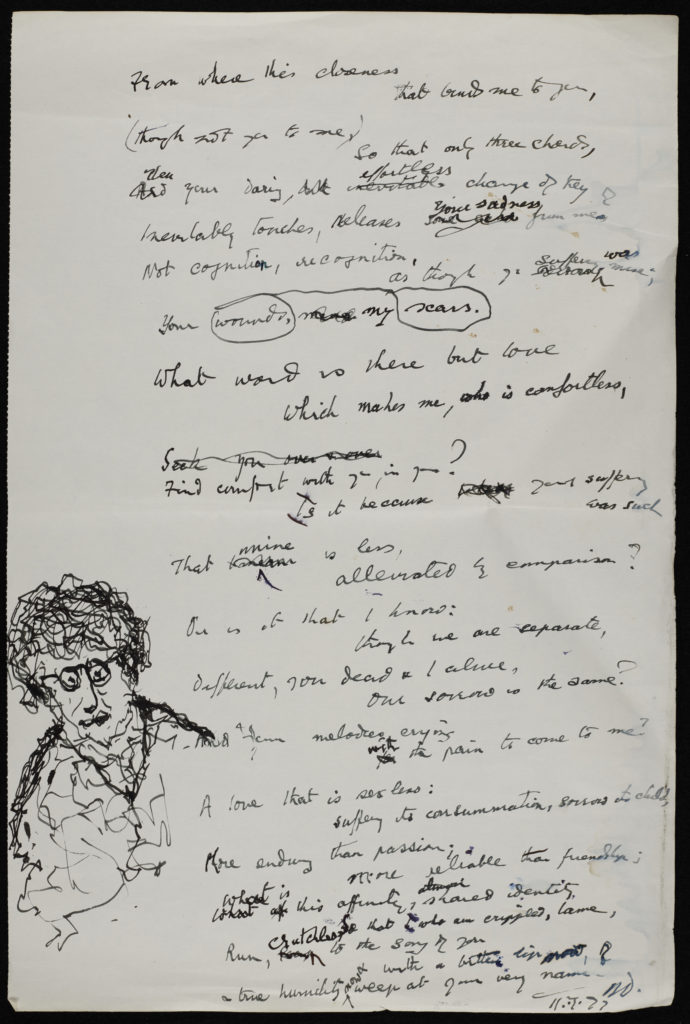‘If I had to grade the necessities of life, I should put them in this order: the sun, for without it we are dead; horses, for without them to look at we are blind; music, for otherwise we are deaf.’
(Duncan, 1964, p. 101)
It is not entirely surprising that Ronald Duncan, close friend of and sometimes librettist for Benjamin Britten, had a deep and intricate relationship with music, a fact touched upon occasionally in the first volume of his autobiography, All men are islands. Duncan makes mention of often visceral responses to musical works, of the bust of Beethoven that he kept with him, of his encounters with musicians (including Stravinsky), and of how he would invent poems to the rhythms or melodies of pieces that he knew; however, his connection with music was at a distance, and, a little below the comment quoted above, he goes on to write
‘Sadly I realised I had been deprived of the one language I needed. For I could not write or read music.’
(Duncan, 1964, p. 101)
Above all other music, Duncan loved that of Franz Schubert, whose birthday it is as I write this post. As described by Duncan, it was a love, like many of his loves seem to have been, immediate in its conception:
‘I was about twelve years old when I met the influence in my life that has affected me more than anything. I went to the theatre and heard Schubert … The play was a sentimental musical comedy, supposedly based on Schubert’s life, called ‘Lilac Time’. It contained a number of his songs. I was quite unable to keep away from the theatre. I went to it twenty-seven times … I cannot possibly explain why I found Schubert an irresistible influence at the age of twelve, or why he has always remained my favourite composer.’
(Duncan, 1964, p. 44)
Part of Schubert’s appeal, in Duncan’s later life at least, may have been the directness of melody and affect in his music, a quality that has made his lieder (songs) amongst the most enduringly admired of the Western tradition, and which permeates his instrumental work also. This directness of communication would have been attractive to Duncan, who considered poetry and, by extension, art more generally, to be a mode of communication:
‘If you can’t hear me, it is probably because I don’t speak loud enough; and, if you don’t understand me, it is because the poetry isn’t any good, because I really feel, very strongly, that poetry should be lucid. I mean it as a communication, and if I fail to make that communication, I ask you to blame me. I do not believe that poetry should be obscure. What I have to say, if I fail to say it, then it’s my fault.’
(Duncan, transcribed from an audio recording of a poetry reading)
The nature and emotional affect of Schubert’s writing is a large subject, but its effect on Duncan is perhaps best illustrated in his own words. The following is extracted from an anecdote about enduring a potential lover playing the piano badly at her home:
… suddenly I heard a melody I had never heard before. It was so beautiful I had to rush from the room, from the house, before the girl or the mother could see my tears. Years later I heard the melody again. Of course it was Schubert – “The Shepherd on the Rock.”
(Duncan, 1964, p. 124)
Duncan’s fascination with Schubert reached its apotheosis with his play, Schubert, completed late in his life (1980), and performed in the same year. The play takes the form of what might be described as an occasionally interrupted monologue by the composer, who works at an ‘untuned rotten piano’. It is, perhaps, a distillation of Duncan’s view of the artist at work: the genius who is at once confident of the brilliance of his own abilities and wrestling with a vortex of social anxiety and emotional (not to mention physical) pain and frailty. Whether or not these romantic ideas appealed to Duncan’s sensibilities of his own artistic and emotional challenges, it is clear from his other writings that he developed an affinity for and, in his own mind, with Schubert that extended beyond simple admiration for the composer’s music. In a poem from 1970, Duncan describes time as a ‘saboteur’ for separating him from his idol, and laments
‘…
What songs we could have written
If your genius with mine
had been combined
Harnessed by our single mind.
Now only silence sings them
The wind mourning for their loss.’
(Duncan, Weston-Smith, 2003, p. 185)
As evidenced in other poems, particularly Franz Schubert, the affinity felt by Duncan for Schubert seems to have had the effect of turning the latter into a distant beloved, to borrow a phrase from Beethoven’s song cycle, with Duncan describing a love
‘…
Far deeper than
I ever knew
For any woman[.]’
(Duncan, Weston-Smith, 2003, pp. 311-3)Page one of the manuscript copy of ‘Franz Schubert’.
Page two of the ‘Franz Schubert’ manuscript.
With his earthlier and sometimes frustrated relationship with Britten in mind, it was, one might suppose, the very separation and lack of artistic consummation that helped Duncan’s nostalgic and idealised affair with Schubert to flourish. This idealisation of Schubert and his music can be felt most strongly, perhaps, in the lines:
‘Only the deaf
dare listen to Schubert,
Music is noise, or too meaningful to bear.
(Duncan, Weston-Smith, 2003, pp. 313)’
Taken with Duncan’s comment, ‘great art affects me like great pain’ (Duncan, 1964, p. 88), this allows us to posit that Schubert specifically, and great music more generally, becomes, for Duncan, a symbol of aching perfection, a reification of and metaphor for the sublime. It is from this position, perhaps, that one of Duncan’s more poignant questions arose:
‘What are notes but tears with wings?’

Manuscript, What are notes but tears with wings? as decorated by Ronald Duncan.
Amongst the Schubert-related items held in the Ronald Duncan Collection are those connected to his plays ‘Girl Friday’ and ‘Schubert’ (including the script, an audio recording of a performance replete with the occasional wrong note at the piano, the music to be played at the ‘untuned rotten piano’, and programmes from performances), his correspondence (particularly with the prominent music lover and patron George Harewood), a film script (Obsession), the scores of some Schubert songs, and materials relevant to his work as the literary editor of ‘The Penguin Book of Accompanied Songs’ (also known as ‘Classical Songs for Children’).
For an enjoyable and easily accessible source of further information on Franz Schubert’s artistic and musical struggles, I would recommend the episode of BBC Radio 3’s ‘The Listening Service’ entitled ‘Schubert’s Dark Side’, which is available from the BBC website: http://www.bbc.co.uk/programmes/b0801l4l
Andrew Cusworth, 31.1.2018
Quoted sources
Duncan, R., All men are islands, Rupert Hart Davies, 1964.
Duncan, R., Weston-Smith, M., Ronald Duncan Literary Foundation, 2003.

